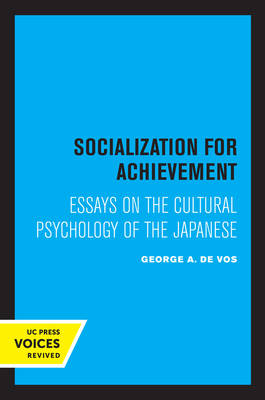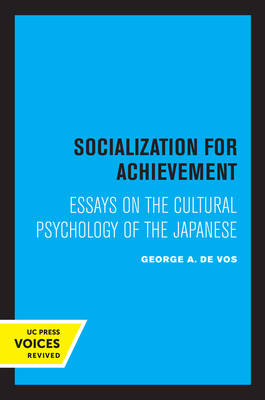
- Afhalen na 1 uur in een winkel met voorraad
- Gratis thuislevering in België vanaf € 30
- Ruim aanbod met 7 miljoen producten
- Afhalen na 1 uur in een winkel met voorraad
- Gratis thuislevering in België vanaf € 30
- Ruim aanbod met 7 miljoen producten
Zoeken
€ 110,45
+ 220 punten
Uitvoering
Omschrijving
Socialization for Achievement: Essays on the Cultural Psychology of the Japanese by George A. De Vos offers a sweeping interdisciplinary inquiry into the ways Japanese culture shapes individual motivation, achievement, and social conformity. Drawing on decades of research that integrates psychology, anthropology, and sociology, De Vos situates Japanese patterns of socialization within a broader theoretical framework for understanding human development. The essays in this collection probe how cultural traditions, child-rearing practices, and enduring familial obligations cultivate deeply internalized needs for accomplishment and self-justification. From analyses of normative role behavior in rural villages to examinations of guilt, arranged marriage, and women's roles, De Vos demonstrates how the dynamics of obligation and endurance anchor Japanese society even amid rapid modernization. His comparative use of psychological testing--including Rorschach and Thematic Apperception protocols--underscores the persistence of cultural continuities in shaping motivation and social identity across generations and settings. In its later sections, the volume turns from sanctioned achievement to the darker terrain of deviance, delinquency, and alienation, illustrating how Japan's strong culture of obligation also produces patterned forms of failure and marginalization. Essays on youth delinquency, gang organization, the Burakumin minority, and suicide trace the interplay between cultural traditions, rapid social change, and the pressures of conformity. Particularly compelling are the accounts of "role narcissism" and the ways in which internalized guilt, rather than shame, drives much Japanese behavior. De Vos argues that Japanese society exemplifies a distinctive form of "socialization for achievement," wherein continuity of cultural psychology tempers institutional transformation, resulting in both extraordinary economic growth and persistent psychological strain. By combining psychoanalytic perspectives with sociological theory, this landmark collection not only illuminates Japan but also advances a general theory of how cultural traditions mediate socialization, achievement, and deviance in human societies. This title is part of UC Press's Voices Revived program, which commemorates University of California Press's mission to seek out and cultivate the brightest minds and give them voice, reach, and impact. Drawing on a backlist dating to 1893, Voices Revived makes high-quality, peer-reviewed scholarship accessible once again using print-on-demand technology. This title was originally published in 1973.
Specificaties
Betrokkenen
- Auteur(s):
- Uitgeverij:
Inhoud
- Aantal bladzijden:
- 622
- Taal:
- Engels
- Reeks:
Eigenschappen
- Productcode (EAN):
- 9780520308244
- Verschijningsdatum:
- 13/05/2022
- Uitvoering:
- Paperback
- Formaat:
- Trade paperback (VS)
- Afmetingen:
- 152 mm x 229 mm
- Gewicht:
- 898 g

Alleen bij Standaard Boekhandel
+ 220 punten op je klantenkaart van Standaard Boekhandel
Beoordelingen
We publiceren alleen reviews die voldoen aan de voorwaarden voor reviews. Bekijk onze voorwaarden voor reviews.








